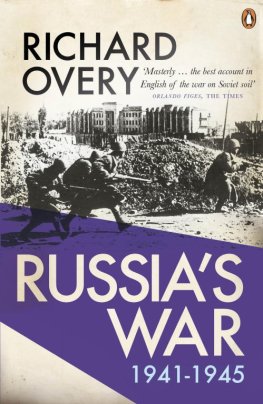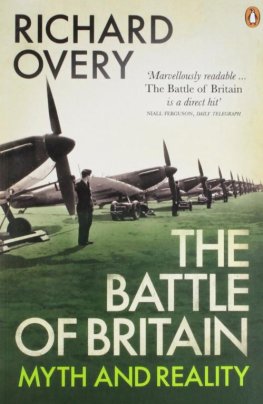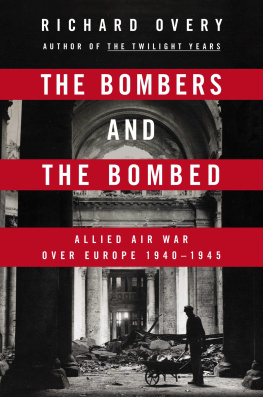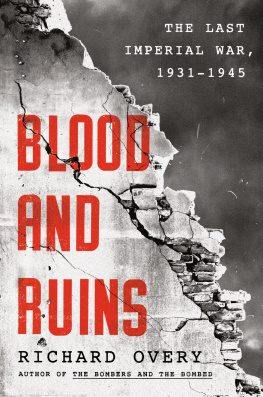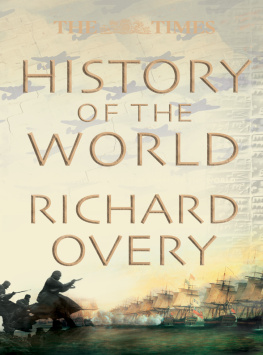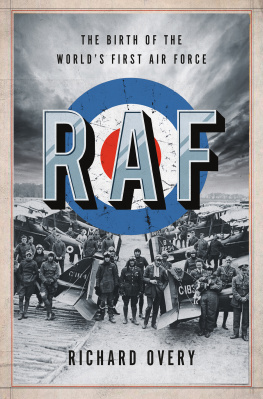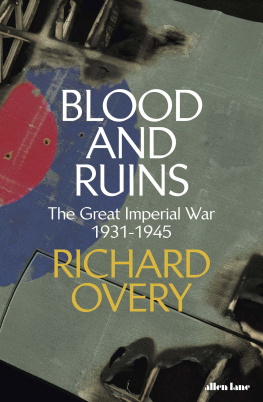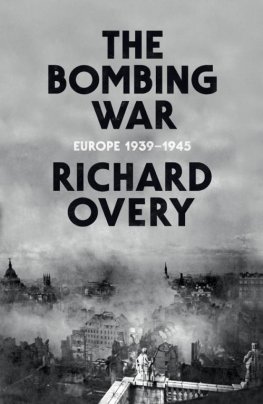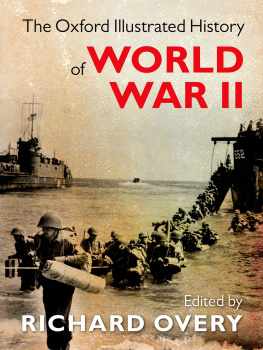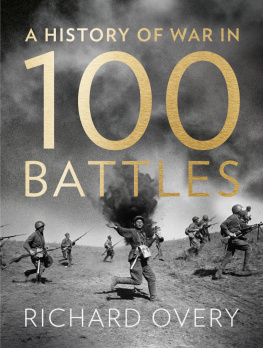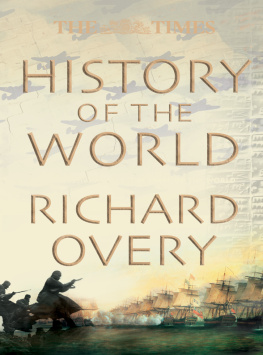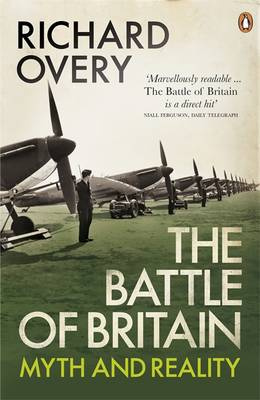Richard Overy - Russia's War
Here you can read online Richard Overy - Russia's War full text of the book (entire story) in english for free. Download pdf and epub, get meaning, cover and reviews about this ebook. City: London, year: 1999, publisher: Penguin Books Ltd, genre: History. Description of the work, (preface) as well as reviews are available. Best literature library LitArk.com created for fans of good reading and offers a wide selection of genres:
Romance novel
Science fiction
Adventure
Detective
Science
History
Home and family
Prose
Art
Politics
Computer
Non-fiction
Religion
Business
Children
Humor
Choose a favorite category and find really read worthwhile books. Enjoy immersion in the world of imagination, feel the emotions of the characters or learn something new for yourself, make an fascinating discovery.
- Book:Russia's War
- Author:
- Publisher:Penguin Books Ltd
- Genre:
- Year:1999
- City:London
- ISBN:978-0-14-192512-7
- Rating:4 / 5
- Favourites:Add to favourites
- Your mark:
- 80
- 1
- 2
- 3
- 4
- 5
Russia's War: summary, description and annotation
We offer to read an annotation, description, summary or preface (depends on what the author of the book "Russia's War" wrote himself). If you haven't found the necessary information about the book — write in the comments, we will try to find it.
Russia's War — read online for free the complete book (whole text) full work
Below is the text of the book, divided by pages. System saving the place of the last page read, allows you to conveniently read the book "Russia's War" online for free, without having to search again every time where you left off. Put a bookmark, and you can go to the page where you finished reading at any time.
Font size:
Interval:
Bookmark:
Richard Overy
RUSSIAS WAR
Preface
The story of the Soviet war effort between 1941 and 1945 is one of the most remarkable, not just in the modern age, but in any age. For a long time it was a story shrouded in secrecy, little known or understood in the West. Over the past decade or so that situation has changed. Few would now contest the view that the Soviet war effort was the most important factor, though not the only one, in the defeat of Germany. The focus of the debate has now shifted to how the Soviet Union achieved that victory, and on this issue there is still no scholarly consensus. There is now a wealth of evidence not available twenty years ago to help to answer that question. Much of Russias War draws on that evidence, which is now widely available in the West. It shows both sides of the war: the war against Germany and the war against Soviet society; the military conflict and the terror.
This book was produced to accompany a television series that has succeeded triumphantly in bringing the Soviet war effort to life. Russias War, a series of ten fifty-two minute documentaries produced and financed by IBP Films in London in association with Victory Series in Russia, was inspired by the changing history of the war. The documentaries show all sides of the war, from military defeat and incompetence to military triumph, from simple Soviet patriotism to the terror of the regime against its own people. The films were made using materials made available from hitherto-closed film sources in the former Soviet Union. They are intercut with testimony from survivors of the war. The interviews were conducted in Russia in 1995, with the exception of a number which were made much earlier for Soviet films.
The inspiration behind the project lay with the executive producer, Judith De Paul, who succeeded in winning the co-operation of five senior Russian film directors and a co-executive producer in Moscow, Alexander Surikov. The films were produced in collaboration over a two-year period in 1994 and 1995. The book was written in 1997 and incorporates further material that became available from Russia in the two preceding years. I am particularly grateful for all the unstinting encouragement that Judith De Paul has given me. I would also like to thank the supervising editor of Russias War, Nick Barnard, who has been unfailingly helpful over the six months it took to produce the book. Vladimir Bouilov has translated at a moments notice anything in Russian that I needed, for which I am more than thankful. My publisher, Peter B. Kaufman, has been patient and long-suffering enough. The usual pre-emptive confession of responsibility for errors and misinterpretations is more than necessary here as I trespass into less familiar territory. A final thanks, as ever, to my family.
Richard OveryLondon, May 1997Introduction
This book is the direct offspring of a remarkable series of television documentaries that were made in London during 1995 with the co-operation of a number of distinguished Russian film-makers. The film records used in making the series were made available from the KGB film collection and the Presidential Archive, and they are unique in their range and historical quality. The very fact that Russias War, the name given to the television series, could be made outside Russia at all reflects the greater openness between Russia and the West following the collapse of the Soviet Union in 1991. The objective of the films is to give Western audiences for the first time as full a visual account of the Soviet war effort as the film sources will allow.
The book follows closely the structure and substance of the films and takes its title from the series. Like the films, the purpose of the book is to bring to a non-Russian readership a history of the Soviet war effort based on the extensive revelations made during the decade after Mikhail Gorbachev declared the age of glasnost. It does not pretend to offer startling new discoveries. It is a summary of the present state of the debate in what has become an extraordinarily unstable historical landscape. Every month brings new discoveries and new publications. The history of the former Soviet Union is in ferment. In twenty years time it may be possible at last to write something approaching a definitive history. Current writing has a provisional air to it, and this book is no exception. Nonetheless, the history of the Soviet war effort between 1941 and 1945 is well worth writing. The spate of new material has not failed to make the subject more exhilarating and more vivid. None of the human drama has been lost. In many ways the revelations have fortified it.
The established story of the Soviet war effort, of the Great Patriotic War, as it came to be called, was allowed to solidify in the decade after 1945 and remained remarkably intact down to the 1980s. In official circles the tale of heroic socialist struggle against the fascist demon remained intact down to 1991. Soviet writing on the war was carefully censored, and the central archives of the conflict remained closed or were restricted to only the most privileged of officially favoured historians. To give but one example: in the 1960s Marshal Zhukov, Stalins Deputy Commander in Chief for much of the war, wrote two volumes of memoirs. They were heavily doctored. The first edition took three years to prepare and was shown, briefly, to Leonid Brezhnev, the Soviet leader, for final approval. Zhukov was told to include the fiction that Brezhnev took part in an incident on the southern front. When the first edition was published Zhukov complained, That book, it is not mine. Even the smallest changes were insisted upon. Where Zhukov wanted to call the failure in the summer of 1941 a rout, he was made to write retreat instead.1
Zhukovs memoirs finally appeared in a tenth, and full, version in 1990. Other memoirs have been released for the first time or have been freed from the censors red pencil. The full version of Khrushchevs taped interviews, many of which were suppressed in the 1960s when his sanitized memoir was published, has now become available.2 Much of the testimony on which it was necessary to rely even ten years ago has turned out to be misleading and distorted, even mendacious. When Zhukov challenged Marshal Yeremenko face-to-face about why he had lied in his memoirs about the role he and Zhukov had played at Stalingrad, Yeremenko replied that Khrushchev had asked him to.3 It may never be possible to penetrate entirely this veil of half-truths and distortions, but there is a genuine will in modern Russia to set the record straight. We now know much more than we did, and we can be more confident that what we do know is closer to historical reality.
There remain serious gaps, however. Wartime Foreign Ministry archives and the records of the main political and administrative organs remain closed, as do the records of the KGB/NKVD security apparatus and military or technical records regarded as still too sensitive to reveal. Even where greater candour has prevailed the publication of official casualty statistics, for example there remain frustrating gaps. The figures published in 1993 by General G. F. Krivosheyev give the fullest account yet available, but they omit three operations that were clear failures. The official figures themselves must be viewed critically, given the difficulty of knowing in the chaos of 1941 and 1942 exactly who had been killed, wounded or even conscripted.4 If the words alleged or suggested or approximately appear with disarming regularity in what follows, this is testament to how much work still needs to be done to provide even an agreed-upon narrative for the war years.
Stalin remains almost as elusive as ever. The crude popular image of Stalin, the triumphant and omnicompetent warlord, disappeared in 1956 when de-Stalinization began in earnest in the Soviet Union. But the absence of a full private archive, or even one based upon Stalins extensive public activities, forces historians to speculate on a great many aspects of his wartime leadership. Much more testimony is available now from Stalins political associates or from his military leaders than ever before, but the inner thoughts, hard to decipher even for those who knew him, remain shrouded. Even the circumstances of his death, discussed at greater length in Chapter 10, cannot be agreed upon among those who claim to have been witnesses.
Font size:
Interval:
Bookmark:
Similar books «Russia's War»
Look at similar books to Russia's War. We have selected literature similar in name and meaning in the hope of providing readers with more options to find new, interesting, not yet read works.
Discussion, reviews of the book Russia's War and just readers' own opinions. Leave your comments, write what you think about the work, its meaning or the main characters. Specify what exactly you liked and what you didn't like, and why you think so.

